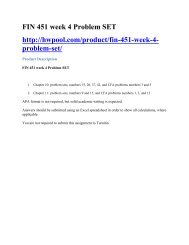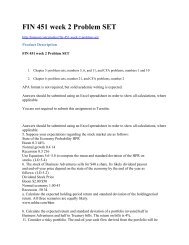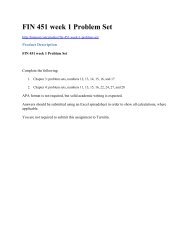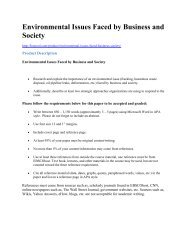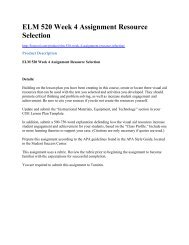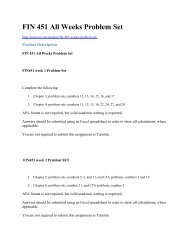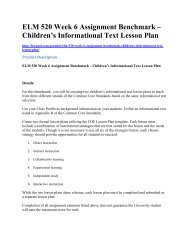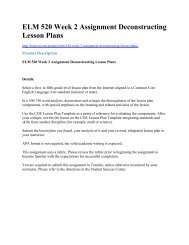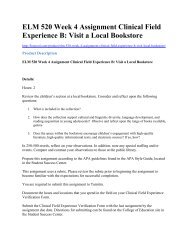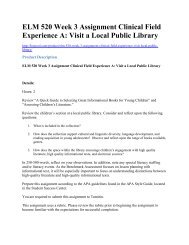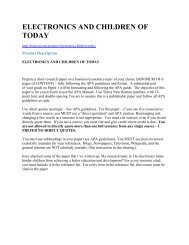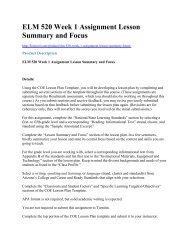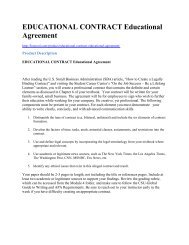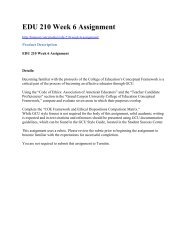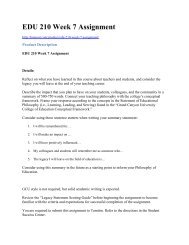Grand Canyon MGT 605 Full Course
Create successful ePaper yourself
Turn your PDF publications into a flip-book with our unique Google optimized e-Paper software.
<strong>Grand</strong> <strong>Canyon</strong> <strong>MGT</strong> <strong>605</strong> <strong>Full</strong> <strong>Course</strong><br />
http://hwpool.com/product/grand-canyon-mgt-<strong>605</strong>-full-course/<br />
Product Description<br />
<strong>Grand</strong> <strong>Canyon</strong> <strong>MGT</strong> <strong>605</strong> <strong>Full</strong> <strong>Course</strong><br />
<strong>MGT</strong><strong>605</strong> Week 1 Discussion DQ 1, DQ 2 & DQ 3<br />
<strong>MGT</strong><strong>605</strong> week 1 DQ 1<br />
In many organizations, being “people-centered” is considered soft, irrelevant, and unrelated to<br />
profitability. Using support from historical perspectives of organizational behavior, explain how<br />
you would rebut these arguments.<br />
<strong>MGT</strong><strong>605</strong> week 1 DQ 2<br />
Review the “Skills Exhibited by an Effective Manager” (Table 1-2 in Organizational Behavior).<br />
Identify your particular areas of strength and discuss opportunities for your own development as<br />
a manager.<br />
<strong>MGT</strong><strong>605</strong> week 1 DQ 3<br />
How would you go about facilitating the creation of diversity in an organization that is<br />
traditionally homogenous? What support is needed from top management in developing a<br />
program to implement organizational diversity? What potential problems of implementing a<br />
diversity program do you foresee and how can they be managed?
<strong>MGT</strong><strong>605</strong> Week 2 Discussion DQ 1, DQ 2 & DQ 3<br />
<strong>MGT</strong><strong>605</strong> week 2 DQ 1<br />
Discuss the role that emotional intelligence (EI) plays in the self-leadership. Be sure to provide<br />
an analysis of all four dimensions of EI (self-awareness, self-management, social awareness, and<br />
relationship management) in your response<br />
<strong>MGT</strong><strong>605</strong> week 2 DQ 2<br />
What are your major terminal and instrumental values? Which values, terminal or instrumental,<br />
are valid predictors of career success in the workplace?<br />
<strong>MGT</strong><strong>605</strong> week 2 DQ 3<br />
Consider the concept of work-family conflict by reflecting on these questions: Is your work<br />
really meeting your needs? Are you defining yourself purely in terms of your accomplishments<br />
at work? Why are you working so hard? To what personal ends are you working? Are you<br />
making significant personal sacrifices in favor of your work? Is your work schedule affecting<br />
other people who are important in your life? Offer some suggestions on how to resolve such<br />
issues.
<strong>MGT</strong><strong>605</strong> Week 3 Discussion DQ 1, DQ 2 & DQ 3<br />
<strong>MGT</strong><strong>605</strong> week 3 DQ 1<br />
Assume for a moment that one of your fellow department managers bursts into your office with a<br />
troubled look on her face. She sits down and says with a tone of disgust, “You can’t do anything<br />
with these new employees . . . they aren’t motivated by money anymore.” Construct a detailed<br />
response (like a script) in which you describe how content and process theories might be used to<br />
motivate employees. Be sure to include comments on two content theories and two process<br />
theories and highlight the significance of each theory.<br />
<strong>MGT</strong><strong>605</strong> week 3 DQ 2<br />
Max Points: 10.0<br />
What is the current design of your job? Assume that the opportunity arose for you to utilize the<br />
idiosyncratic deals (i-deals) in redesigning your job. What would you do to make your job<br />
inherently more motivating? How would you design the feedback and reward systems in the new<br />
job?<br />
<strong>MGT</strong><strong>605</strong> week 3 DQ 3
What is the current design of your job? Assume that the opportunity arose for you to utilize the<br />
idiosyncratic deals (i-deals) in redesigning your job. What would you do to make your job<br />
inherently more motivating? How would you design the feedback and reward systems in the new<br />
job?<br />
<strong>MGT</strong><strong>605</strong> Week 4 Discussion DQ 1, DQ 2 & DQ 3<br />
<strong>MGT</strong><strong>605</strong> week 4 DQ 1<br />
Choose any group to which you currently belong or have belonged to in the past. Discuss the<br />
type of group, its intended purpose, and how it was formed. What were some benefits and<br />
challenges you faced while working in this group? How might those benefits and challenges<br />
differ in a virtual group setting?<br />
<strong>MGT</strong><strong>605</strong> week 4 DQ 2<br />
Refer to Table 11-4 in the Krietner and Kinicki textbook. Which of the reasons for team failure<br />
have you experienced and how would you do things differently to ensure that any team you are<br />
involved in will be successful?<br />
<strong>MGT</strong><strong>605</strong> week 4 DQ 3
Although virtual teams are becoming more prevalent, there have been mixed reviews on their<br />
effectiveness. Read “The Best Online Platforms for Virtual Meetings,” “5 Tips for Virtual<br />
Collaboration,” and “Yahoo Orders Homeworkers Back to the Office” (attached in the Module 4<br />
Topic Materials). Discuss the steps you would take to manage a successful virtual team (be sure<br />
to discuss how you would choose a platform to use and guidelines for monitoring virtual team<br />
performance).<br />
<strong>MGT</strong><strong>605</strong> Week 5 Discussion DQ 1, DQ 2 & DQ 3<br />
<strong>MGT</strong><strong>605</strong> Week 5 DQ 1<br />
Max Points: 10.0<br />
Many types of negotiations occur in business settings. This example is indicative of the ethical<br />
dilemmas inherent in many negotiations.<br />
Assume for a moment that you are the owner – CEO of a small machine and tool company. You<br />
have 35 employees, most of whom are highly skilled machinists who belong to Local 999 of the<br />
International Brotherhood of Good Guys Union. Generally, you are an open manager with an<br />
abiding sense of fair play and ethics. For this reason, you have been able to attract workers who<br />
are skilled and committed to the company’s long-term success. In fact, labor relations are calm –<br />
even harmonious. For example, contract violations are usually handled between you and shop<br />
stewards in a problem-solving context with an almost complete absence of acrimony or<br />
contentiousness. Now, however, you face a serious and unprecedented issue. Due to an economic<br />
downturn, business activity has taken a sharp decline with the expectation that things will get<br />
much worse. You have just met with your accountant who has informed you there is no other<br />
choice but to lay off people or reduce wages. Your initial meeting with the union representatives<br />
shocked you into reality since it was filled with divisiveness, arguing, name-calling, and even<br />
occasional profanity. Things turn much worse in the second meeting since the union lawyers<br />
were present. After reading the article by Reitz, Wall, and Love (attached in the Module 5 Topic<br />
Materials), you are stunned to discover that the deceptive tactics outlined in the article read like a
primer for what the union is doing. Answer the following questions based on the case and the<br />
article:<br />
1. What type of conflict is occurring in this case and what conflict management style would you, as<br />
the manager use? Justify your choice.<br />
2. What are your options given the union’s apparent duplicity and lack of ethical standards? The last<br />
negotiations ended with your attorney angrily advising you to “fight fire with fire,” meaning that<br />
business conditions dictate loosening your standards of integrity and honesty in negotiation. The<br />
problem is you think she may be right. Describe specifically what you would do.<br />
<strong>MGT</strong><strong>605</strong> Week 5 DQ 2<br />
Answer the following questions based on the case presented in DQ 1:<br />
1. What are the challenges to effective communication in this case and how can these challenges be<br />
mitigated?<br />
2. How would evidence-based decision making help in resolving this case?<br />
<strong>MGT</strong><strong>605</strong> Week 5 DQ 3<br />
Workers increasingly rely on means of technology-mediated communication in the workplace.<br />
Besides email, workers commonly utilize tools, such as instant messaging and virtual meeting<br />
spaces, to regularly interact with coworkers and clients. How do you think such tools impact<br />
interpersonal dynamics in the workplace? What are the benefits and challenges of these tools?<br />
How might those challenges be overcome?
<strong>MGT</strong><strong>605</strong> Week 6 Discussion DQ 1, DQ 2 & DQ 3<br />
<strong>MGT</strong><strong>605</strong> Week 6 DQ 1<br />
What are the key values of your organization? How are they vital to understanding the politics<br />
within the organization, the influence tactics used, and the power bases emphasized in the<br />
organization? Why is understanding all of these important to you as a citizen of the organization?<br />
<strong>MGT</strong><strong>605</strong> Week 6 DQ 2<br />
Conduct some web-based research into two organizations that profess to have adopted a servant<br />
leadership philosophy (e.g., SWA, Men’s Warehouse, TDIndustries). What are the<br />
organizations’ values? Compare these organizations to others in the same industry using major<br />
performance metrics (employee turnover, market share, profitability, etc.) and conclude whether<br />
or not you think having a servant leader philosophy makes a significant difference in company<br />
performance.<br />
<strong>MGT</strong><strong>605</strong> Week 6 DQ 3<br />
Read Suzanne Peterson’s article, “Leaders, Too, Need Support.” How do you see yourself in the<br />
role of supportive follower? What challenges do you have with this concept? What can you do to<br />
overcome those challenges?
<strong>MGT</strong><strong>605</strong> Week 7 Discussion DQ 1, DQ 2 & DQ 3<br />
<strong>MGT</strong><strong>605</strong> Week 7 DQ 1<br />
One of your managers heard you have just completed your MBA. He looked at you and smirked<br />
and said, “All this emphasis on relationships is overrated. I have always made it clear to my<br />
subordinates what they need to do if they want to remain employed. All I have to say to them is,<br />
‘Get it done and you will get rewarded, and if not, there will be consequences.’ It truly is that<br />
simple! Developing relationships with employees and suppliers or contractors, all that stuff is<br />
only good in the textbooks. It never delivers results.” Prepare a response to him and post it on the<br />
discussion board.<br />
<strong>MGT</strong><strong>605</strong> Week 7 DQ 2<br />
Contrast the tradeoffs involved when an organization decides it is going to restructure. Be sure<br />
that you evaluate the critical organizational design variables that you would want to consider if<br />
you were heading up such a project.<br />
<strong>MGT</strong><strong>605</strong> Week 7 DQ 3<br />
Evaluate the organizational chart for your current organization. Provide recommendations for<br />
revising the organizational design so it more effectively serves the mission of the firm and its<br />
many stakeholders.
<strong>MGT</strong><strong>605</strong> Week 8 Discussion DQ 1, DQ 2 & DQ 3<br />
<strong>MGT</strong><strong>605</strong> Week 8 DQ 1<br />
With technology revolutionizing the way that work is done, we see significant changes in both<br />
the organization of work as well as in organizational cultures. Read “How corporate culture will<br />
change in the face of openness” and “Remodeling corporate culture for the digital era” (attached<br />
in the Module 8 Topic Materials). Based on the articles, discuss the major opportunities and<br />
challenges that these shifts present.<br />
<strong>MGT</strong><strong>605</strong> Week 8 DQ 2<br />
Discuss the ethical implications of a leader’s role in the socialization of new hires into the<br />
preexisting culture of an organization. What responsibility does a company have to inform newly<br />
hired persons that it wants to shape their values, perceptions, and behavior to conform to the<br />
organization’s culture? What impact does socialization have on both individual and<br />
organizational effectiveness?<br />
<strong>MGT</strong><strong>605</strong> Week 8 DQ 3<br />
Contrast the corporate values espoused by two Fortune 500 companies. Select two firms that<br />
seem to manifest very different cultures. Your response should focus on the tradeoffs you would<br />
experience working in the two firms in terms of the values you bring to the workplace. How<br />
might your values fit in or clash with the culture of these two organizations?
<strong>MGT</strong><strong>605</strong> Week 2 Assignent Latest<br />
Details:<br />
Self-awareness is essential for developing management and leadership skills. Recognizing your<br />
own strengths, weaknesses, and values, and understanding emotional intelligence and learning<br />
styles can help you to be a more effective leader. Becoming self-aware is an ongoing process<br />
requiring introspection. The more often people practice self-reflection, the more opportunities<br />
they have to understand their own behaviors and adapt their approaches to working with other<br />
people, which can improve both your own and other’s abilities to meet their professional goals.<br />
For the Module 2 assignment, you have the opportunity to take a variety of self-assessments to<br />
learn more about yourself and identify your assets and weaknesses as a leader. This will assist<br />
you in discovering how you can improve your own self-leadership skills. You will be asked to<br />
think critically about your results and submit a reflection as directed below.<br />
The Module 2 assignment is only the beginning of a self-reflective process you are asked to<br />
undertake in this course. You should continue to think about your self-leadership skills as you<br />
progress through the readings and assignments. You will be asked to refer back to your selfassessment<br />
results and reflection when you compose your Leadership Philosophy statement,<br />
which is due later in Module 6. The Module 6 assignment will ask you to build on the reflection<br />
written in Module 2 in order to clearly articulate your values and leadership qualities and how<br />
they form the basis for effectively leading others and your organization.<br />
Refer to “<strong>MGT</strong>-<strong>605</strong> Self-Assessment Links” (attached in the Topic Material). Complete at least<br />
one test from each of the first four categories andboth of the Diversity Tolerance assessments:<br />
1. Emotional Intelligence<br />
2. Personality Test<br />
3. Learning Styles<br />
4. Values Survey<br />
5. Diversity Tolerance<br />
Be sure to document the results of each assessment to assist you in completing the reflection<br />
portion of the assignment below.<br />
Self-Assessment Reflection
After completing the self-assessments, write a 1,000-1,250 word reflection in which you discuss<br />
the following:<br />
1. Describe the importance of self-awareness, self-concept, and emotional intelligence and the role<br />
they play in enabling effective leadership.<br />
2. Briefly summarize the results of each of the six tests you completed. In general, do you believe<br />
the results represent who you are? Explain.<br />
3. What insights have you gained about yourself after taking the assessments? How could this<br />
knowledge influence your values, attitude towards others, and how you approach new tasks in the<br />
workplace?<br />
4. Explain the significance of the self-assessment results in relation to your individual behavior,<br />
your behavior within groups, and within organizations. What have you learned about your ability<br />
to manage others within the workplace? What have you learned about what it takes to manage<br />
yourself or how you respond to the management tactics of others within the workplace?<br />
Prepare this assignment according to the APA guidelines found in the APA Style Guide, located<br />
in the Student Success Center. An abstract is not required.<br />
This assignment uses a rubric. Please review the rubric prior to beginning the assignment to<br />
become familiar with the expectations for successful completion.<br />
You are required to submit this assignment to Turnitin. Please refer to the directions in the<br />
Student Success Center.<br />
<strong>MGT</strong><strong>605</strong> Week 3 Assignment<br />
Details:<br />
Leading teams of diverse individuals is a significant challenge. Negotiating individual strengths,<br />
weaknesses, and personalities can be difficult. Nonetheless, as a leader it is your responsibility to<br />
effectively lead teams through establishing expectations designed to motivate individuals,<br />
fostering critical decision-making skills, and improving communication and collaboration among<br />
teammates. For the assignments in modules 4 and 5, as part of the management team at a<br />
successful, regional airline, West Coast Transit, you have been directed to form a team for a<br />
high-stakes, high-pressure project. Together, the management team will come to a consensus and<br />
make a recommendation to the director.
Your objective is to individually select a team of six people from the given teammate profiles.<br />
Begin by reading “West Coast Transit Company Profile” and “West Coast Transit Team<br />
Member Profiles,” which are attached in the Topic Materials. Based on your understanding of<br />
the company, the project, and the people involved propose your team selection. Your proposal<br />
should be accompanied by a 1,000-1,250 explanation that addresses the following:<br />
1. Why did you select the six team members you did? Why did you decide against the others?<br />
2. Considering the diverse factors that may influence the behavior of your team members, what<br />
specific strategies will you use to motivate this particular team of individuals? Why do you think<br />
they will work? What motivational strategies do you think would be ineffective for this team?<br />
Why?<br />
3. What particular challenges or conflicts can you anticipate this team facing? What strategies might<br />
you apply to manage this team’s potential conflicts? (You will learn more about conflict<br />
management in Module 5. It is acceptable to make relevant speculations based on what you know<br />
about the team members and conflict management at this point. You will have the opportunity to<br />
solidify your conflict management strategies when you join the CLC assignment in Module 5.)<br />
4. Finally, summarize your vision for the success of this team. Based on what you have identified as<br />
the team’s particular strengths and weaknesses, which specific leadership strategies might you<br />
apply to ensure it is ultimately successful? Why?<br />
Prepare this assignment according to the APA guidelines found in the APA Style Guide, located<br />
in the Student Success Center. An abstract is not required.<br />
This assignment uses a rubric. Please review the rubric prior to beginning the assignment to<br />
become familiar with the expectations for successful completion.<br />
You are required to submit this assignment to Turnitin. Please refer to the directions in the<br />
Student Success Center.<br />
<strong>MGT</strong><strong>605</strong> Week 5 & 8 (CLC PEAR EVALUATION) Assignment<br />
WEEK 5
<strong>MGT</strong>-<strong>605</strong> CLC Peer Evaluation Form<br />
Complete this peer evaluation for each member of your team, including yourself. The average<br />
score from these evaluations will be used to determineyour final grade for the assignment.<br />
Rate each team member on a scale of 1-100, with 100 being the highest. Use the rubric on the<br />
second page to determine the score for each team member. Include comments explaining why<br />
you gave your teammate this score.<br />
Your peer evaluations will be kept strictly confidential. Your grade for the evaluation will be<br />
posted in the gradebook as an assignment, but individual ratings will not be shared.<br />
Comments:<br />
Group Must be<br />
member: Rating: completed<br />
List<br />
names<br />
1-100 for each<br />
team<br />
member.<br />
1. Your<br />
name<br />
2.<br />
3.<br />
4.<br />
5.<br />
6.<br />
Scores will be calculated as follows:<br />
<br />
After the total for each student has been added together and divided by the number of team<br />
members rating him/her, calculate the following: ___/100 x 2% =____ out of 2 points for this<br />
evaluation.<br />
WEEK 8<br />
<strong>MGT</strong>-<strong>605</strong> CLC Peer Evaluation Form
Complete this peer evaluation for each member of your team, including yourself. The average<br />
score from these evaluations will be used to determineyour final grade for the assignment.<br />
Rate each team member on a scale of 1-100, with 100 being the highest. Use the rubric on the<br />
second page to determine the score for each team member. Include comments explaining why<br />
you gave your teammate this score.<br />
Your peer evaluations will be kept strictly confidential. Your grade for the evaluation will be<br />
posted in the gradebook as an assignment, but individual ratings will not be shared.<br />
Comments:<br />
Group Must be<br />
member: Rating: completed<br />
List<br />
names<br />
1-100 for each<br />
team<br />
member.<br />
1. Your<br />
name<br />
2.<br />
3.<br />
4.<br />
5.<br />
6.<br />
Scores will be calculated as follows:<br />
<br />
After the total for each student has been added together and divided by the number of team<br />
members rating him/her, calculate the following: ___/100 x 2% =____ out of 2 points for this<br />
evaluation.<br />
<strong>MGT</strong><strong>605</strong> Week 6 Assignment<br />
Details:<br />
In earlier modules you explored the influence of self-awareness on your leadership style and<br />
established that a clear understanding of your abilities, motivation, and goals provides a firm
foundation for leading others. Leadership studies demonstrate that the most effective leaders<br />
know how to draw upon self-leadership skills to in turn motivate and lead others to expand their<br />
strengths to ultimately better serve the goals of an organization. For this assignment you will<br />
look at a leadership example from contemporary media and evaluate how well the particular<br />
leader exemplifies the qualities of effective and ethical leadership. Then, you will compose your<br />
own Leadership Philosophy statement to articulate the qualities that will make you an effective<br />
leader of people and organizations.<br />
Part 1:<br />
For Part 1, select a relevant and topical leadership issue from the contemporary news media that<br />
revolves around ethics and ethical decision making. Topics must be approved by your instructor.<br />
Once approved, research the situation and gather data in order to evaluate the dynamics of the<br />
situation. Write an evaluation (500-750 words) of the situation that addresses the following:<br />
1. The power bases used by the leader.<br />
2. The influence tactics used by the leader.<br />
3. The leadership style of the leader.<br />
4. The outcome (or potential outcome) of the situation.<br />
Conclude by justifying whether or not you think this leader is effective and if they acted<br />
ethically.<br />
Next, imagine yourself as a practitioner of servant leadership. You have been appointed into the<br />
leadership role in this same circumstance. Explain how the situation would be different. Address<br />
the four criteria listed above in your discussion.<br />
Part 2:<br />
For Part 2, develop a Leadership Philosophy statement as an appendix to your evaluation in Part<br />
1. Begin by reviewing your self-assessments results from Module 2 and reflecting on what you<br />
have learned about effective leadership in the course. Keep in mind that one’s Leadership<br />
Philosophy is a unique statement that encapsulates your own view of leadership so the final<br />
product may vary; however, your statement should incorporate the following:<br />
1. Personal values and beliefs that influence your leadership style.<br />
2. Past experiences and/or people that have influenced the development of those values.<br />
3. Expectations of self and others.<br />
4. Leadership style and influence tactics.
Your goal is to create a distinctive statement (250-500 words) that incorporates the above<br />
elements. The end product should clearly articulate how you view yourself as a leader and how<br />
others would view you as a leader. It should also make clear how you can contribute to the<br />
success of other people and an organization as a whole.<br />
Prepare this assignment according to the APA guidelines found in the APA Style Guide, located<br />
in the Student Success Center. An abstract is not required.<br />
This assignment uses a rubric. Please review the rubric prior to beginning the assignment to<br />
become familiar with the expectations for successful completion.<br />
You are required to submit this assignment to Turnitin.<br />
<strong>MGT</strong><strong>605</strong> Week 6 Assignment<br />
Details:<br />
In earlier modules you explored the influence of self-awareness on your leadership style and<br />
established that a clear understanding of your abilities, motivation, and goals provides a firm<br />
foundation for leading others. Leadership studies demonstrate that the most effective leaders<br />
know how to draw upon self-leadership skills to in turn motivate and lead others to expand their<br />
strengths to ultimately better serve the goals of an organization. For this assignment you will<br />
look at a leadership example from contemporary media and evaluate how well the particular<br />
leader exemplifies the qualities of effective and ethical leadership. Then, you will compose your<br />
own Leadership Philosophy statement to articulate the qualities that will make you an effective<br />
leader of people and organizations.<br />
Part 1:<br />
For Part 1, select a relevant and topical leadership issue from the contemporary news media that<br />
revolves around ethics and ethical decision making. Topics must be approved by your instructor.<br />
Once approved, research the situation and gather data in order to evaluate the dynamics of the<br />
situation. Write an evaluation (500-750 words) of the situation that addresses the following:<br />
1. The power bases used by the leader.
2. The influence tactics used by the leader.<br />
3. The leadership style of the leader.<br />
4. The outcome (or potential outcome) of the situation.<br />
Conclude by justifying whether or not you think this leader is effective and if they acted<br />
ethically.<br />
Next, imagine yourself as a practitioner of servant leadership. You have been appointed into the<br />
leadership role in this same circumstance. Explain how the situation would be different. Address<br />
the four criteria listed above in your discussion.<br />
Part 2:<br />
For Part 2, develop a Leadership Philosophy statement as an appendix to your evaluation in Part<br />
1. Begin by reviewing your self-assessments results from Module 2 and reflecting on what you<br />
have learned about effective leadership in the course. Keep in mind that one’s Leadership<br />
Philosophy is a unique statement that encapsulates your own view of leadership so the final<br />
product may vary; however, your statement should incorporate the following:<br />
1. Personal values and beliefs that influence your leadership style.<br />
2. Past experiences and/or people that have influenced the development of those values.<br />
3. Expectations of self and others.<br />
4. Leadership style and influence tactics.<br />
Your goal is to create a distinctive statement (250-500 words) that incorporates the above<br />
elements. The end product should clearly articulate how you view yourself as a leader and how<br />
others would view you as a leader. It should also make clear how you can contribute to the<br />
success of other people and an organization as a whole.<br />
Prepare this assignment according to the APA guidelines found in the APA Style Guide, located<br />
in the Student Success Center. An abstract is not required.<br />
This assignment uses a rubric. Please review the rubric prior to beginning the assignment to<br />
become familiar with the expectations for successful completion.<br />
You are required to submit this assignment to Turnitin.



